Counseling and Loss: Impact of Personal Experience on Practice
VerifiedAdded on 2023/04/25
|9
|2736
|416
Essay
AI Summary
This essay is a reflective piece by a student detailing their personal experience of loss, specifically the death of their father during childhood, and its profound impact on their life and future career as a counselor. The student recounts the traumatic circumstances surrounding the loss, including witnessing violence and subsequent displacement, highlighting the primary and secondary losses experienced. The essay delves into the application of various grief models, such as the five stages of grief and Tonkin's model, to understand their grieving process. It emphasizes the significance of social support and cultural factors in coping with loss. Furthermore, the essay explores how this personal history has shaped their values, driving their desire to assist others facing similar challenges and advocate for justice. The student reflects on the potential influence of their past experiences on their professional practice, highlighting the importance of feeling safe, supported, and the role of psychological interventions. Finally, it underlines the various factors that influence the way people grieve and mourn.
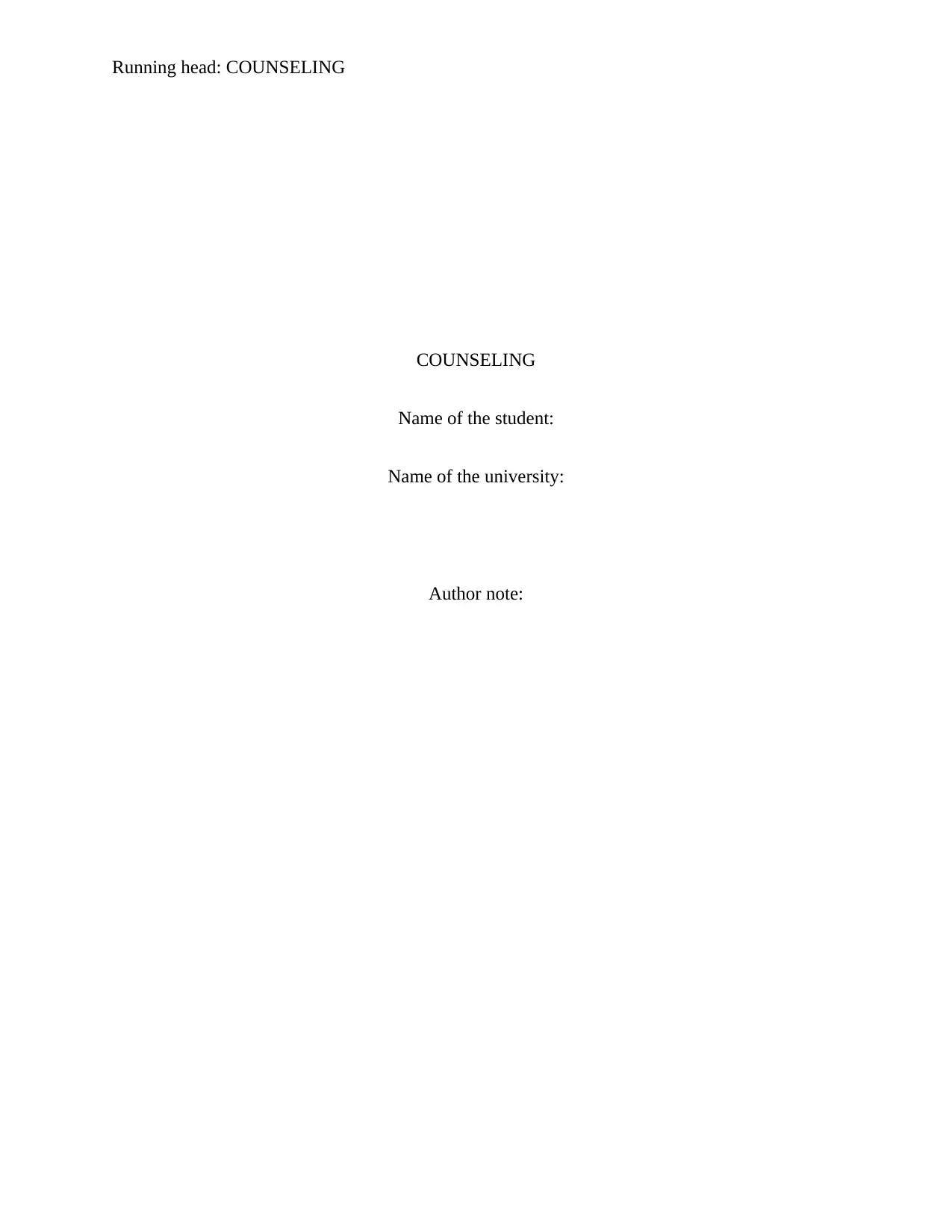
Running head: COUNSELING
COUNSELING
Name of the student:
Name of the university:
Author note:
COUNSELING
Name of the student:
Name of the university:
Author note:
Paraphrase This Document
Need a fresh take? Get an instant paraphrase of this document with our AI Paraphraser
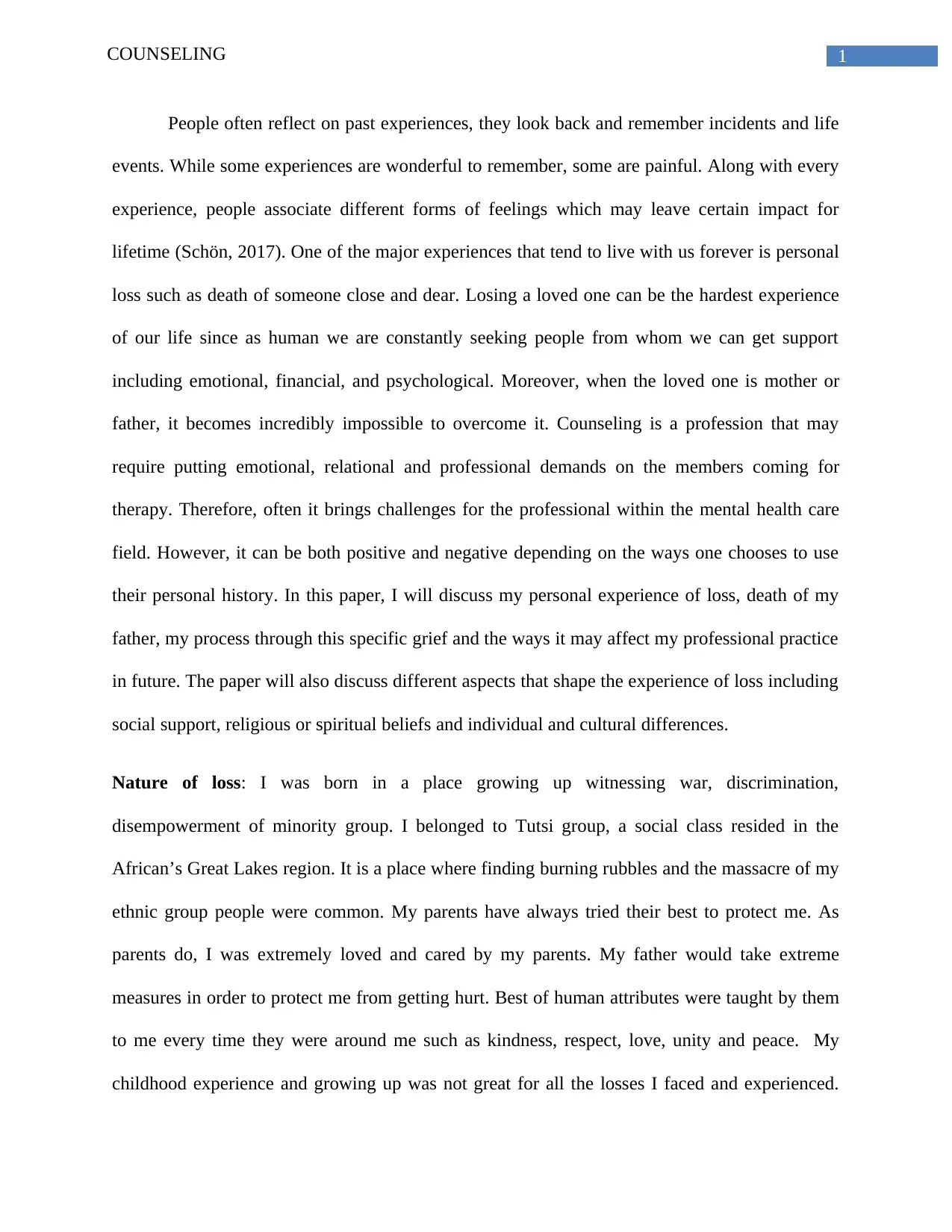
1COUNSELING
People often reflect on past experiences, they look back and remember incidents and life
events. While some experiences are wonderful to remember, some are painful. Along with every
experience, people associate different forms of feelings which may leave certain impact for
lifetime (Schön, 2017). One of the major experiences that tend to live with us forever is personal
loss such as death of someone close and dear. Losing a loved one can be the hardest experience
of our life since as human we are constantly seeking people from whom we can get support
including emotional, financial, and psychological. Moreover, when the loved one is mother or
father, it becomes incredibly impossible to overcome it. Counseling is a profession that may
require putting emotional, relational and professional demands on the members coming for
therapy. Therefore, often it brings challenges for the professional within the mental health care
field. However, it can be both positive and negative depending on the ways one chooses to use
their personal history. In this paper, I will discuss my personal experience of loss, death of my
father, my process through this specific grief and the ways it may affect my professional practice
in future. The paper will also discuss different aspects that shape the experience of loss including
social support, religious or spiritual beliefs and individual and cultural differences.
Nature of loss: I was born in a place growing up witnessing war, discrimination,
disempowerment of minority group. I belonged to Tutsi group, a social class resided in the
African’s Great Lakes region. It is a place where finding burning rubbles and the massacre of my
ethnic group people were common. My parents have always tried their best to protect me. As
parents do, I was extremely loved and cared by my parents. My father would take extreme
measures in order to protect me from getting hurt. Best of human attributes were taught by them
to me every time they were around me such as kindness, respect, love, unity and peace. My
childhood experience and growing up was not great for all the losses I faced and experienced.
People often reflect on past experiences, they look back and remember incidents and life
events. While some experiences are wonderful to remember, some are painful. Along with every
experience, people associate different forms of feelings which may leave certain impact for
lifetime (Schön, 2017). One of the major experiences that tend to live with us forever is personal
loss such as death of someone close and dear. Losing a loved one can be the hardest experience
of our life since as human we are constantly seeking people from whom we can get support
including emotional, financial, and psychological. Moreover, when the loved one is mother or
father, it becomes incredibly impossible to overcome it. Counseling is a profession that may
require putting emotional, relational and professional demands on the members coming for
therapy. Therefore, often it brings challenges for the professional within the mental health care
field. However, it can be both positive and negative depending on the ways one chooses to use
their personal history. In this paper, I will discuss my personal experience of loss, death of my
father, my process through this specific grief and the ways it may affect my professional practice
in future. The paper will also discuss different aspects that shape the experience of loss including
social support, religious or spiritual beliefs and individual and cultural differences.
Nature of loss: I was born in a place growing up witnessing war, discrimination,
disempowerment of minority group. I belonged to Tutsi group, a social class resided in the
African’s Great Lakes region. It is a place where finding burning rubbles and the massacre of my
ethnic group people were common. My parents have always tried their best to protect me. As
parents do, I was extremely loved and cared by my parents. My father would take extreme
measures in order to protect me from getting hurt. Best of human attributes were taught by them
to me every time they were around me such as kindness, respect, love, unity and peace. My
childhood experience and growing up was not great for all the losses I faced and experienced.
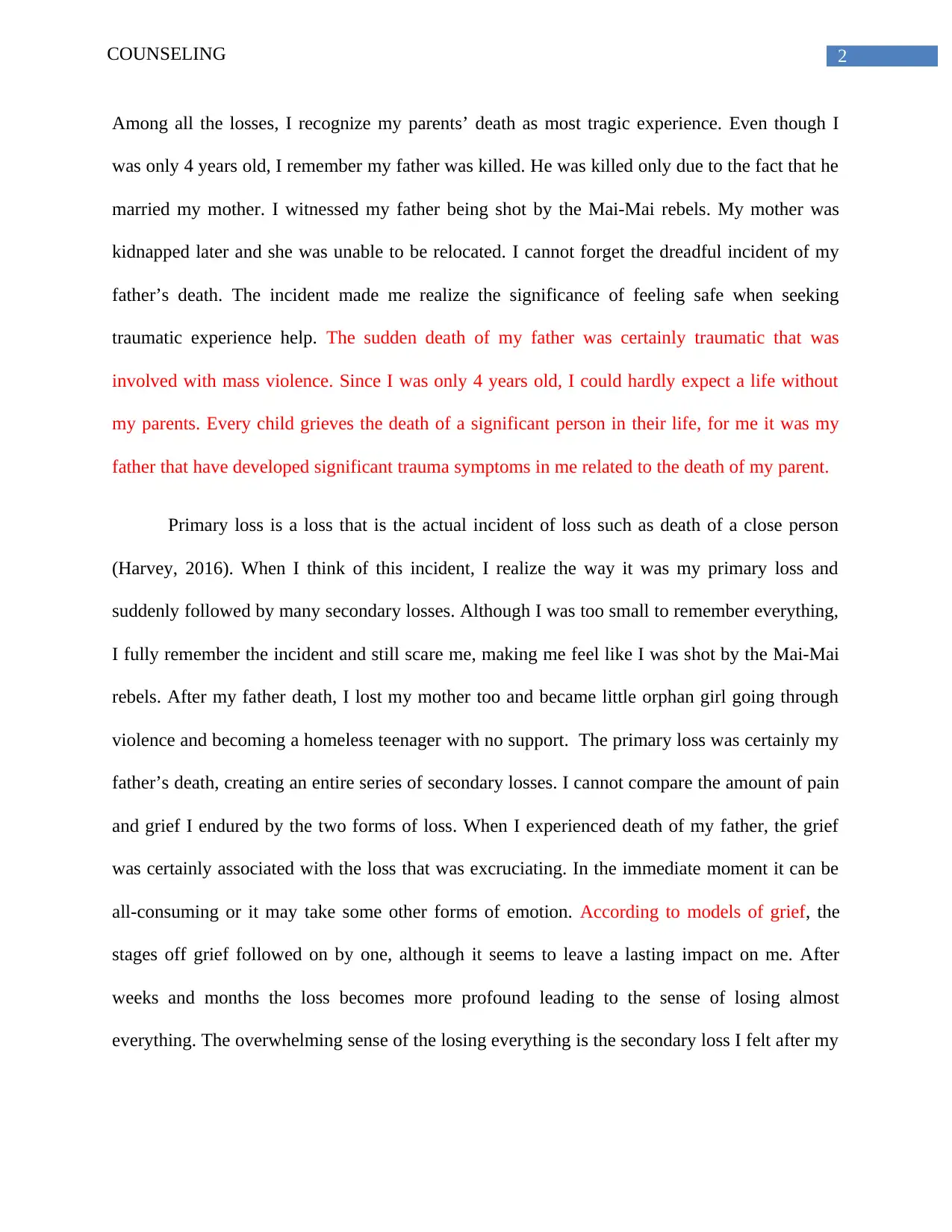
2COUNSELING
Among all the losses, I recognize my parents’ death as most tragic experience. Even though I
was only 4 years old, I remember my father was killed. He was killed only due to the fact that he
married my mother. I witnessed my father being shot by the Mai-Mai rebels. My mother was
kidnapped later and she was unable to be relocated. I cannot forget the dreadful incident of my
father’s death. The incident made me realize the significance of feeling safe when seeking
traumatic experience help. The sudden death of my father was certainly traumatic that was
involved with mass violence. Since I was only 4 years old, I could hardly expect a life without
my parents. Every child grieves the death of a significant person in their life, for me it was my
father that have developed significant trauma symptoms in me related to the death of my parent.
Primary loss is a loss that is the actual incident of loss such as death of a close person
(Harvey, 2016). When I think of this incident, I realize the way it was my primary loss and
suddenly followed by many secondary losses. Although I was too small to remember everything,
I fully remember the incident and still scare me, making me feel like I was shot by the Mai-Mai
rebels. After my father death, I lost my mother too and became little orphan girl going through
violence and becoming a homeless teenager with no support. The primary loss was certainly my
father’s death, creating an entire series of secondary losses. I cannot compare the amount of pain
and grief I endured by the two forms of loss. When I experienced death of my father, the grief
was certainly associated with the loss that was excruciating. In the immediate moment it can be
all-consuming or it may take some other forms of emotion. According to models of grief, the
stages off grief followed on by one, although it seems to leave a lasting impact on me. After
weeks and months the loss becomes more profound leading to the sense of losing almost
everything. The overwhelming sense of the losing everything is the secondary loss I felt after my
Among all the losses, I recognize my parents’ death as most tragic experience. Even though I
was only 4 years old, I remember my father was killed. He was killed only due to the fact that he
married my mother. I witnessed my father being shot by the Mai-Mai rebels. My mother was
kidnapped later and she was unable to be relocated. I cannot forget the dreadful incident of my
father’s death. The incident made me realize the significance of feeling safe when seeking
traumatic experience help. The sudden death of my father was certainly traumatic that was
involved with mass violence. Since I was only 4 years old, I could hardly expect a life without
my parents. Every child grieves the death of a significant person in their life, for me it was my
father that have developed significant trauma symptoms in me related to the death of my parent.
Primary loss is a loss that is the actual incident of loss such as death of a close person
(Harvey, 2016). When I think of this incident, I realize the way it was my primary loss and
suddenly followed by many secondary losses. Although I was too small to remember everything,
I fully remember the incident and still scare me, making me feel like I was shot by the Mai-Mai
rebels. After my father death, I lost my mother too and became little orphan girl going through
violence and becoming a homeless teenager with no support. The primary loss was certainly my
father’s death, creating an entire series of secondary losses. I cannot compare the amount of pain
and grief I endured by the two forms of loss. When I experienced death of my father, the grief
was certainly associated with the loss that was excruciating. In the immediate moment it can be
all-consuming or it may take some other forms of emotion. According to models of grief, the
stages off grief followed on by one, although it seems to leave a lasting impact on me. After
weeks and months the loss becomes more profound leading to the sense of losing almost
everything. The overwhelming sense of the losing everything is the secondary loss I felt after my
⊘ This is a preview!⊘
Do you want full access?
Subscribe today to unlock all pages.

Trusted by 1+ million students worldwide
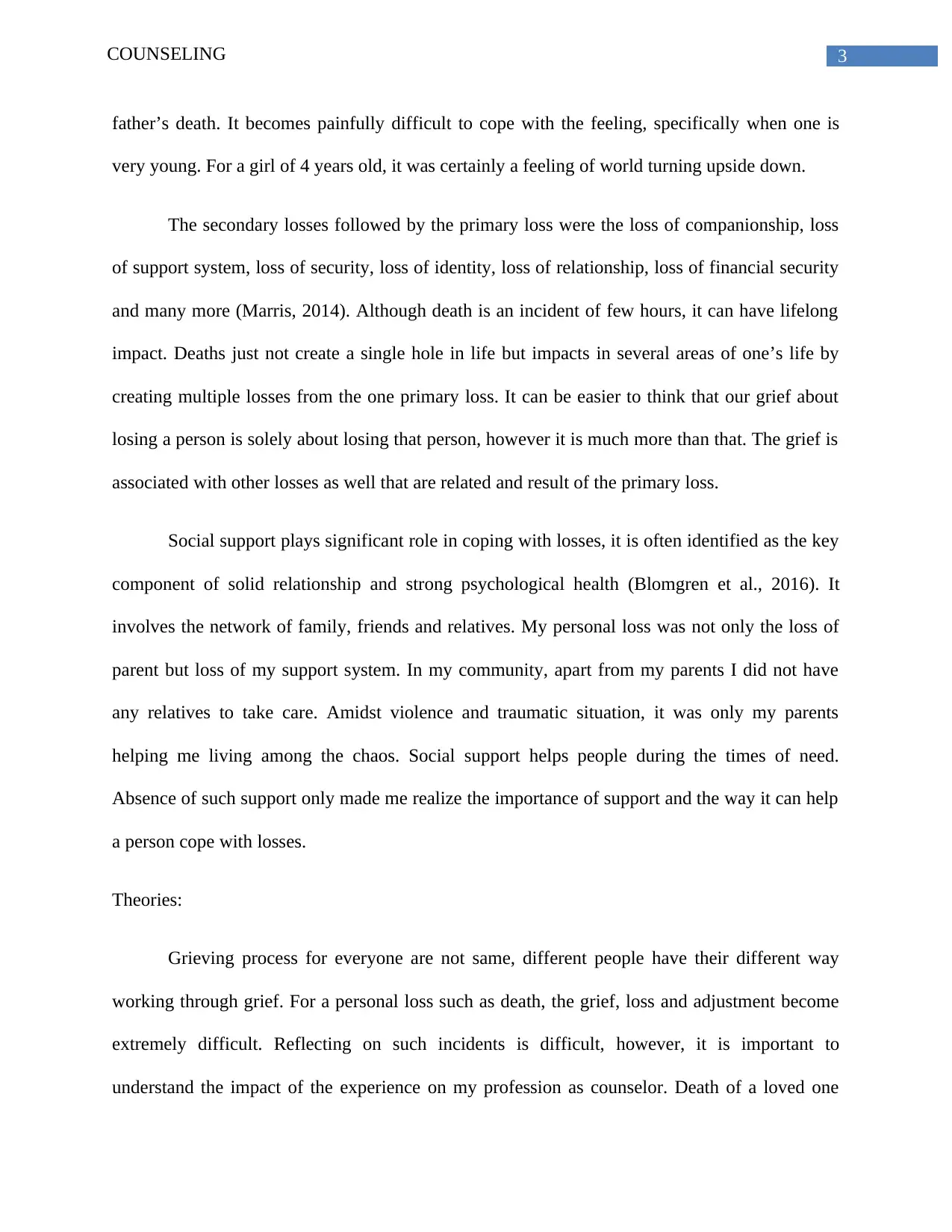
3COUNSELING
father’s death. It becomes painfully difficult to cope with the feeling, specifically when one is
very young. For a girl of 4 years old, it was certainly a feeling of world turning upside down.
The secondary losses followed by the primary loss were the loss of companionship, loss
of support system, loss of security, loss of identity, loss of relationship, loss of financial security
and many more (Marris, 2014). Although death is an incident of few hours, it can have lifelong
impact. Deaths just not create a single hole in life but impacts in several areas of one’s life by
creating multiple losses from the one primary loss. It can be easier to think that our grief about
losing a person is solely about losing that person, however it is much more than that. The grief is
associated with other losses as well that are related and result of the primary loss.
Social support plays significant role in coping with losses, it is often identified as the key
component of solid relationship and strong psychological health (Blomgren et al., 2016). It
involves the network of family, friends and relatives. My personal loss was not only the loss of
parent but loss of my support system. In my community, apart from my parents I did not have
any relatives to take care. Amidst violence and traumatic situation, it was only my parents
helping me living among the chaos. Social support helps people during the times of need.
Absence of such support only made me realize the importance of support and the way it can help
a person cope with losses.
Theories:
Grieving process for everyone are not same, different people have their different way
working through grief. For a personal loss such as death, the grief, loss and adjustment become
extremely difficult. Reflecting on such incidents is difficult, however, it is important to
understand the impact of the experience on my profession as counselor. Death of a loved one
father’s death. It becomes painfully difficult to cope with the feeling, specifically when one is
very young. For a girl of 4 years old, it was certainly a feeling of world turning upside down.
The secondary losses followed by the primary loss were the loss of companionship, loss
of support system, loss of security, loss of identity, loss of relationship, loss of financial security
and many more (Marris, 2014). Although death is an incident of few hours, it can have lifelong
impact. Deaths just not create a single hole in life but impacts in several areas of one’s life by
creating multiple losses from the one primary loss. It can be easier to think that our grief about
losing a person is solely about losing that person, however it is much more than that. The grief is
associated with other losses as well that are related and result of the primary loss.
Social support plays significant role in coping with losses, it is often identified as the key
component of solid relationship and strong psychological health (Blomgren et al., 2016). It
involves the network of family, friends and relatives. My personal loss was not only the loss of
parent but loss of my support system. In my community, apart from my parents I did not have
any relatives to take care. Amidst violence and traumatic situation, it was only my parents
helping me living among the chaos. Social support helps people during the times of need.
Absence of such support only made me realize the importance of support and the way it can help
a person cope with losses.
Theories:
Grieving process for everyone are not same, different people have their different way
working through grief. For a personal loss such as death, the grief, loss and adjustment become
extremely difficult. Reflecting on such incidents is difficult, however, it is important to
understand the impact of the experience on my profession as counselor. Death of a loved one
Paraphrase This Document
Need a fresh take? Get an instant paraphrase of this document with our AI Paraphraser
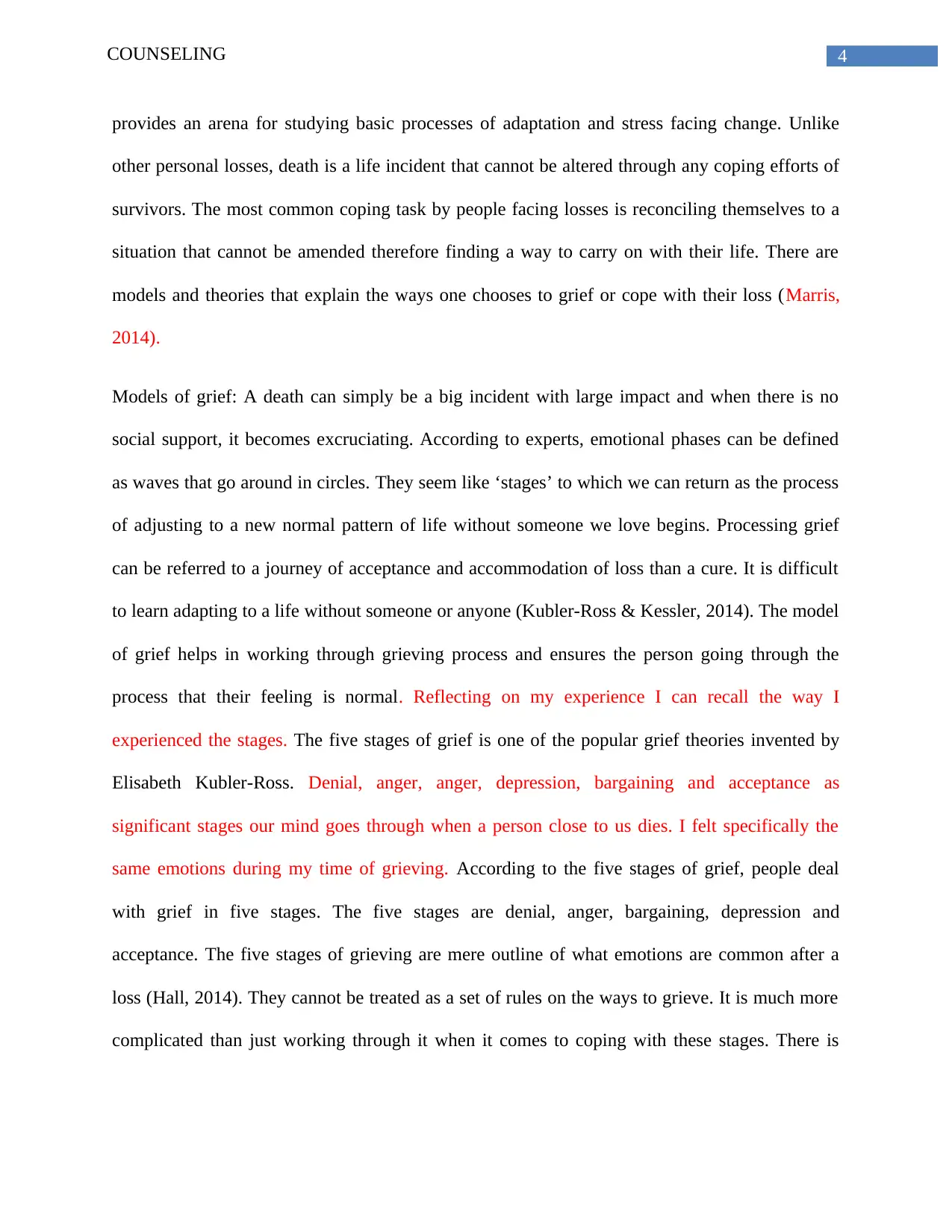
4COUNSELING
provides an arena for studying basic processes of adaptation and stress facing change. Unlike
other personal losses, death is a life incident that cannot be altered through any coping efforts of
survivors. The most common coping task by people facing losses is reconciling themselves to a
situation that cannot be amended therefore finding a way to carry on with their life. There are
models and theories that explain the ways one chooses to grief or cope with their loss (Marris,
2014).
Models of grief: A death can simply be a big incident with large impact and when there is no
social support, it becomes excruciating. According to experts, emotional phases can be defined
as waves that go around in circles. They seem like ‘stages’ to which we can return as the process
of adjusting to a new normal pattern of life without someone we love begins. Processing grief
can be referred to a journey of acceptance and accommodation of loss than a cure. It is difficult
to learn adapting to a life without someone or anyone (Kubler-Ross & Kessler, 2014). The model
of grief helps in working through grieving process and ensures the person going through the
process that their feeling is normal. Reflecting on my experience I can recall the way I
experienced the stages. The five stages of grief is one of the popular grief theories invented by
Elisabeth Kubler-Ross. Denial, anger, anger, depression, bargaining and acceptance as
significant stages our mind goes through when a person close to us dies. I felt specifically the
same emotions during my time of grieving. According to the five stages of grief, people deal
with grief in five stages. The five stages are denial, anger, bargaining, depression and
acceptance. The five stages of grieving are mere outline of what emotions are common after a
loss (Hall, 2014). They cannot be treated as a set of rules on the ways to grieve. It is much more
complicated than just working through it when it comes to coping with these stages. There is
provides an arena for studying basic processes of adaptation and stress facing change. Unlike
other personal losses, death is a life incident that cannot be altered through any coping efforts of
survivors. The most common coping task by people facing losses is reconciling themselves to a
situation that cannot be amended therefore finding a way to carry on with their life. There are
models and theories that explain the ways one chooses to grief or cope with their loss (Marris,
2014).
Models of grief: A death can simply be a big incident with large impact and when there is no
social support, it becomes excruciating. According to experts, emotional phases can be defined
as waves that go around in circles. They seem like ‘stages’ to which we can return as the process
of adjusting to a new normal pattern of life without someone we love begins. Processing grief
can be referred to a journey of acceptance and accommodation of loss than a cure. It is difficult
to learn adapting to a life without someone or anyone (Kubler-Ross & Kessler, 2014). The model
of grief helps in working through grieving process and ensures the person going through the
process that their feeling is normal. Reflecting on my experience I can recall the way I
experienced the stages. The five stages of grief is one of the popular grief theories invented by
Elisabeth Kubler-Ross. Denial, anger, anger, depression, bargaining and acceptance as
significant stages our mind goes through when a person close to us dies. I felt specifically the
same emotions during my time of grieving. According to the five stages of grief, people deal
with grief in five stages. The five stages are denial, anger, bargaining, depression and
acceptance. The five stages of grieving are mere outline of what emotions are common after a
loss (Hall, 2014). They cannot be treated as a set of rules on the ways to grieve. It is much more
complicated than just working through it when it comes to coping with these stages. There is
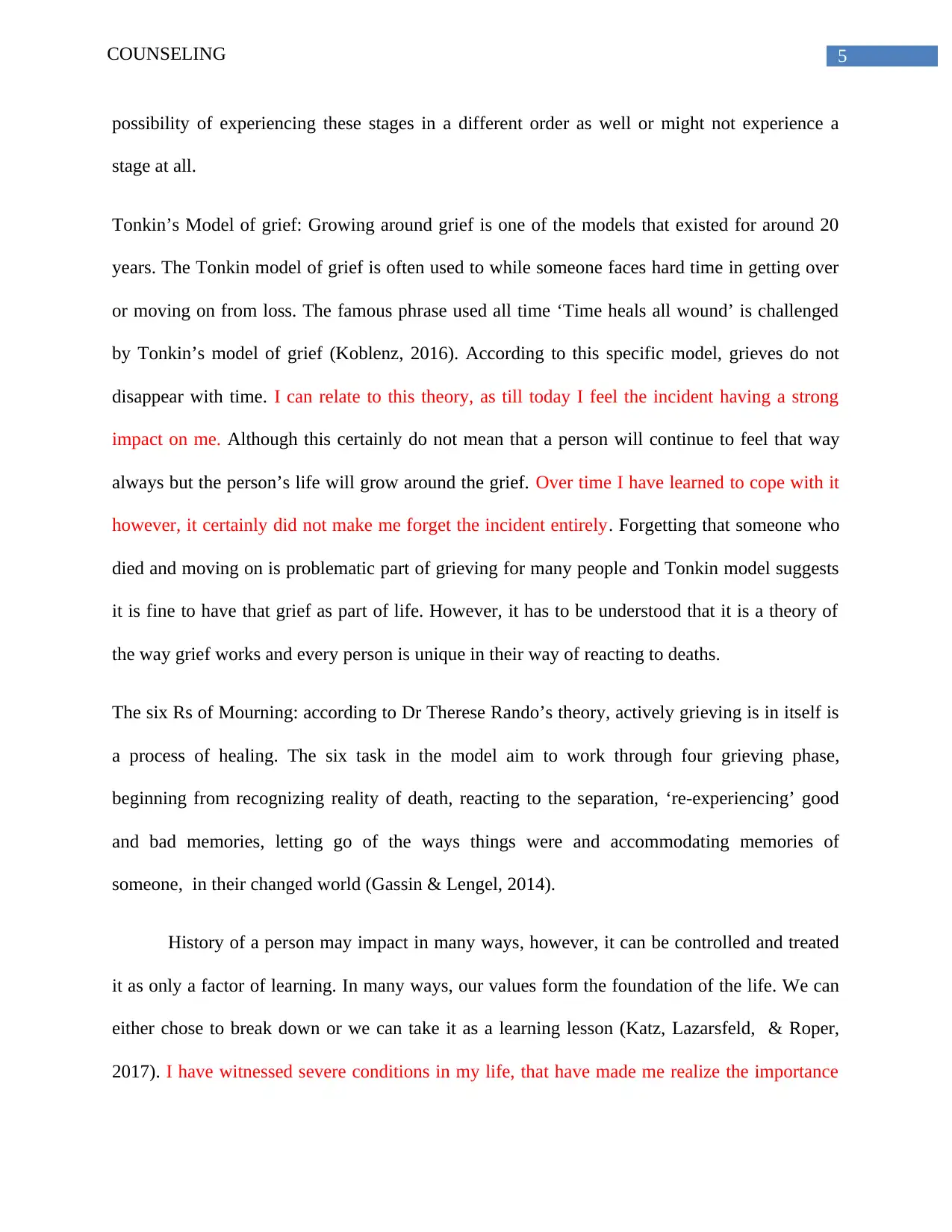
5COUNSELING
possibility of experiencing these stages in a different order as well or might not experience a
stage at all.
Tonkin’s Model of grief: Growing around grief is one of the models that existed for around 20
years. The Tonkin model of grief is often used to while someone faces hard time in getting over
or moving on from loss. The famous phrase used all time ‘Time heals all wound’ is challenged
by Tonkin’s model of grief (Koblenz, 2016). According to this specific model, grieves do not
disappear with time. I can relate to this theory, as till today I feel the incident having a strong
impact on me. Although this certainly do not mean that a person will continue to feel that way
always but the person’s life will grow around the grief. Over time I have learned to cope with it
however, it certainly did not make me forget the incident entirely. Forgetting that someone who
died and moving on is problematic part of grieving for many people and Tonkin model suggests
it is fine to have that grief as part of life. However, it has to be understood that it is a theory of
the way grief works and every person is unique in their way of reacting to deaths.
The six Rs of Mourning: according to Dr Therese Rando’s theory, actively grieving is in itself is
a process of healing. The six task in the model aim to work through four grieving phase,
beginning from recognizing reality of death, reacting to the separation, ‘re-experiencing’ good
and bad memories, letting go of the ways things were and accommodating memories of
someone, in their changed world (Gassin & Lengel, 2014).
History of a person may impact in many ways, however, it can be controlled and treated
it as only a factor of learning. In many ways, our values form the foundation of the life. We can
either chose to break down or we can take it as a learning lesson (Katz, Lazarsfeld, & Roper,
2017). I have witnessed severe conditions in my life, that have made me realize the importance
possibility of experiencing these stages in a different order as well or might not experience a
stage at all.
Tonkin’s Model of grief: Growing around grief is one of the models that existed for around 20
years. The Tonkin model of grief is often used to while someone faces hard time in getting over
or moving on from loss. The famous phrase used all time ‘Time heals all wound’ is challenged
by Tonkin’s model of grief (Koblenz, 2016). According to this specific model, grieves do not
disappear with time. I can relate to this theory, as till today I feel the incident having a strong
impact on me. Although this certainly do not mean that a person will continue to feel that way
always but the person’s life will grow around the grief. Over time I have learned to cope with it
however, it certainly did not make me forget the incident entirely. Forgetting that someone who
died and moving on is problematic part of grieving for many people and Tonkin model suggests
it is fine to have that grief as part of life. However, it has to be understood that it is a theory of
the way grief works and every person is unique in their way of reacting to deaths.
The six Rs of Mourning: according to Dr Therese Rando’s theory, actively grieving is in itself is
a process of healing. The six task in the model aim to work through four grieving phase,
beginning from recognizing reality of death, reacting to the separation, ‘re-experiencing’ good
and bad memories, letting go of the ways things were and accommodating memories of
someone, in their changed world (Gassin & Lengel, 2014).
History of a person may impact in many ways, however, it can be controlled and treated
it as only a factor of learning. In many ways, our values form the foundation of the life. We can
either chose to break down or we can take it as a learning lesson (Katz, Lazarsfeld, & Roper,
2017). I have witnessed severe conditions in my life, that have made me realize the importance
⊘ This is a preview!⊘
Do you want full access?
Subscribe today to unlock all pages.

Trusted by 1+ million students worldwide
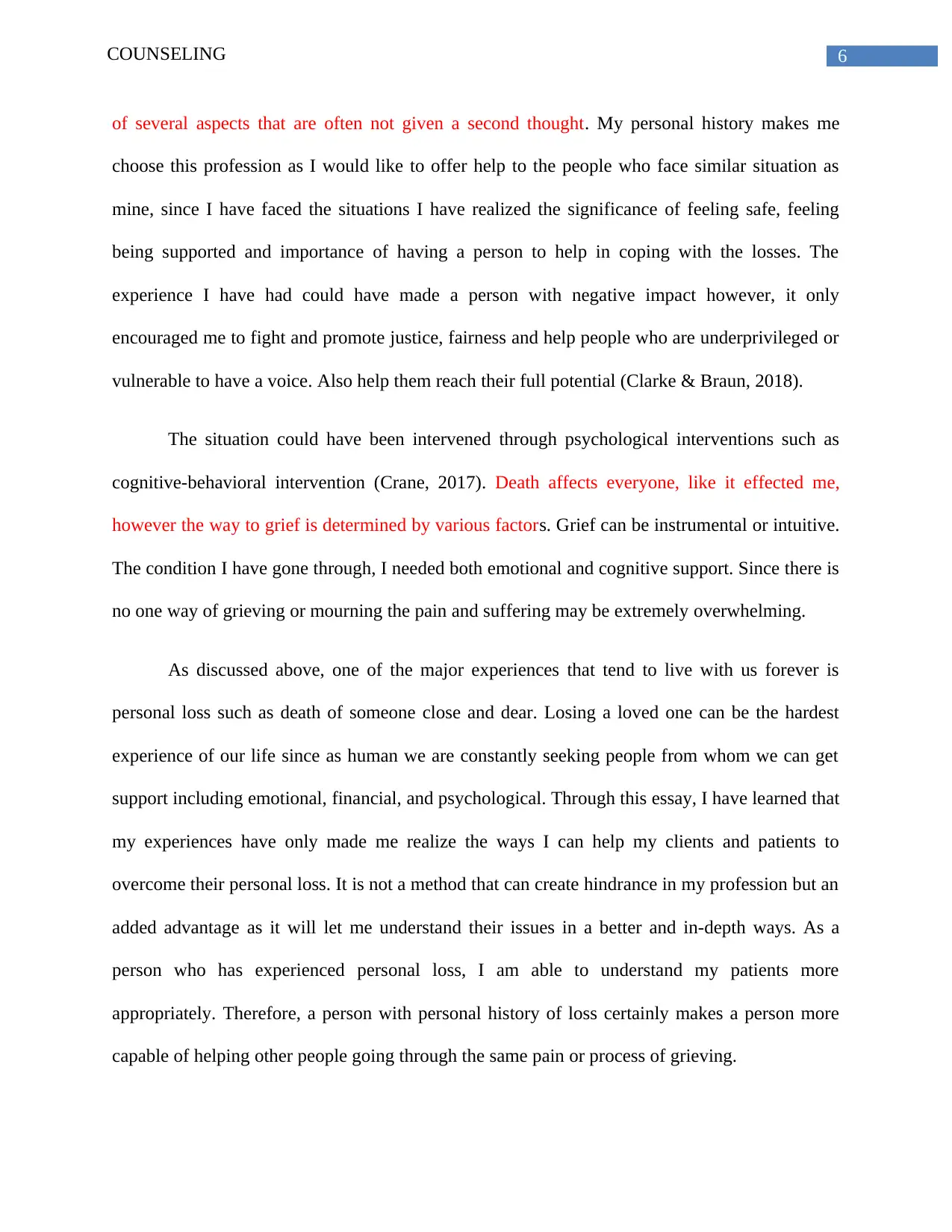
6COUNSELING
of several aspects that are often not given a second thought. My personal history makes me
choose this profession as I would like to offer help to the people who face similar situation as
mine, since I have faced the situations I have realized the significance of feeling safe, feeling
being supported and importance of having a person to help in coping with the losses. The
experience I have had could have made a person with negative impact however, it only
encouraged me to fight and promote justice, fairness and help people who are underprivileged or
vulnerable to have a voice. Also help them reach their full potential (Clarke & Braun, 2018).
The situation could have been intervened through psychological interventions such as
cognitive-behavioral intervention (Crane, 2017). Death affects everyone, like it effected me,
however the way to grief is determined by various factors. Grief can be instrumental or intuitive.
The condition I have gone through, I needed both emotional and cognitive support. Since there is
no one way of grieving or mourning the pain and suffering may be extremely overwhelming.
As discussed above, one of the major experiences that tend to live with us forever is
personal loss such as death of someone close and dear. Losing a loved one can be the hardest
experience of our life since as human we are constantly seeking people from whom we can get
support including emotional, financial, and psychological. Through this essay, I have learned that
my experiences have only made me realize the ways I can help my clients and patients to
overcome their personal loss. It is not a method that can create hindrance in my profession but an
added advantage as it will let me understand their issues in a better and in-depth ways. As a
person who has experienced personal loss, I am able to understand my patients more
appropriately. Therefore, a person with personal history of loss certainly makes a person more
capable of helping other people going through the same pain or process of grieving.
of several aspects that are often not given a second thought. My personal history makes me
choose this profession as I would like to offer help to the people who face similar situation as
mine, since I have faced the situations I have realized the significance of feeling safe, feeling
being supported and importance of having a person to help in coping with the losses. The
experience I have had could have made a person with negative impact however, it only
encouraged me to fight and promote justice, fairness and help people who are underprivileged or
vulnerable to have a voice. Also help them reach their full potential (Clarke & Braun, 2018).
The situation could have been intervened through psychological interventions such as
cognitive-behavioral intervention (Crane, 2017). Death affects everyone, like it effected me,
however the way to grief is determined by various factors. Grief can be instrumental or intuitive.
The condition I have gone through, I needed both emotional and cognitive support. Since there is
no one way of grieving or mourning the pain and suffering may be extremely overwhelming.
As discussed above, one of the major experiences that tend to live with us forever is
personal loss such as death of someone close and dear. Losing a loved one can be the hardest
experience of our life since as human we are constantly seeking people from whom we can get
support including emotional, financial, and psychological. Through this essay, I have learned that
my experiences have only made me realize the ways I can help my clients and patients to
overcome their personal loss. It is not a method that can create hindrance in my profession but an
added advantage as it will let me understand their issues in a better and in-depth ways. As a
person who has experienced personal loss, I am able to understand my patients more
appropriately. Therefore, a person with personal history of loss certainly makes a person more
capable of helping other people going through the same pain or process of grieving.
Paraphrase This Document
Need a fresh take? Get an instant paraphrase of this document with our AI Paraphraser
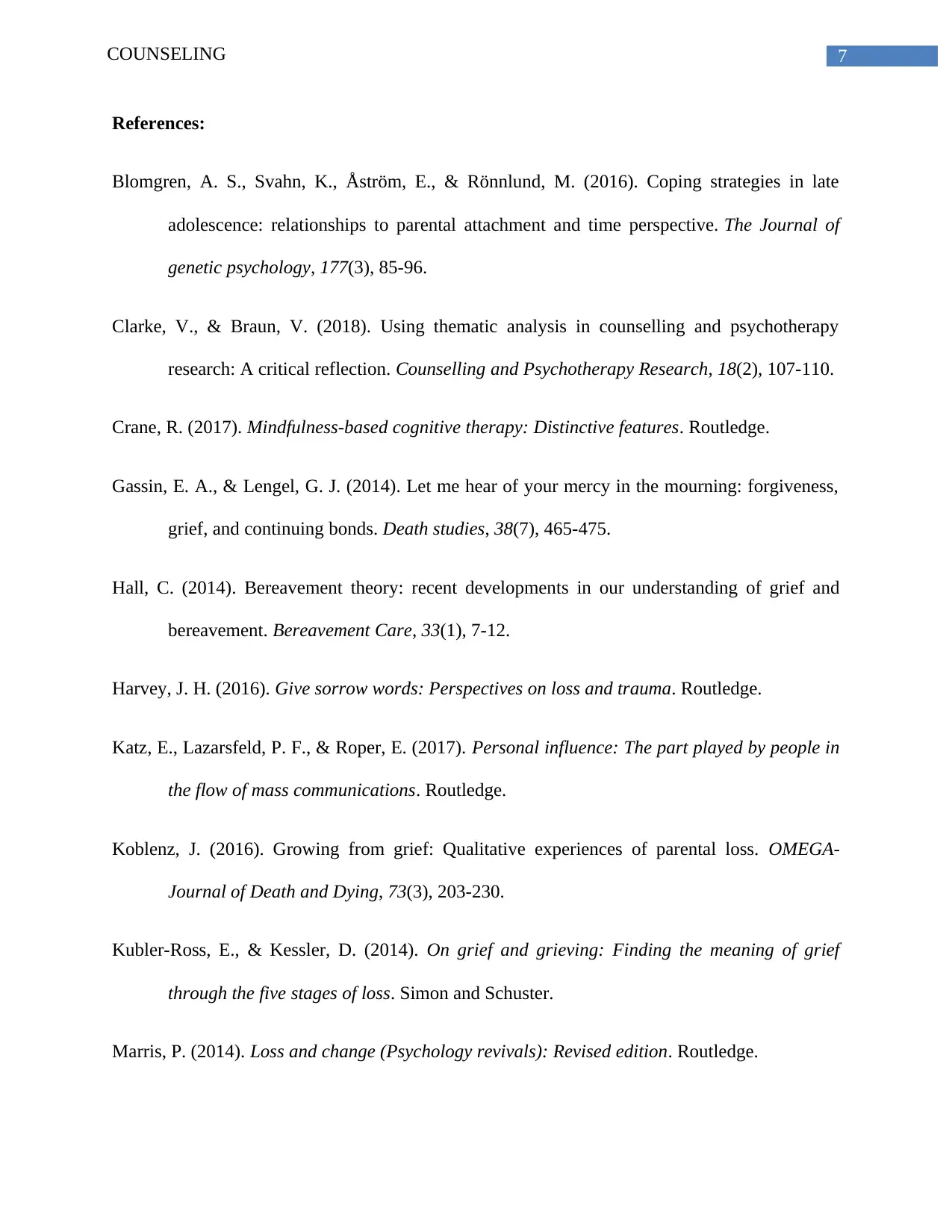
7COUNSELING
References:
Blomgren, A. S., Svahn, K., Åström, E., & Rönnlund, M. (2016). Coping strategies in late
adolescence: relationships to parental attachment and time perspective. The Journal of
genetic psychology, 177(3), 85-96.
Clarke, V., & Braun, V. (2018). Using thematic analysis in counselling and psychotherapy
research: A critical reflection. Counselling and Psychotherapy Research, 18(2), 107-110.
Crane, R. (2017). Mindfulness-based cognitive therapy: Distinctive features. Routledge.
Gassin, E. A., & Lengel, G. J. (2014). Let me hear of your mercy in the mourning: forgiveness,
grief, and continuing bonds. Death studies, 38(7), 465-475.
Hall, C. (2014). Bereavement theory: recent developments in our understanding of grief and
bereavement. Bereavement Care, 33(1), 7-12.
Harvey, J. H. (2016). Give sorrow words: Perspectives on loss and trauma. Routledge.
Katz, E., Lazarsfeld, P. F., & Roper, E. (2017). Personal influence: The part played by people in
the flow of mass communications. Routledge.
Koblenz, J. (2016). Growing from grief: Qualitative experiences of parental loss. OMEGA-
Journal of Death and Dying, 73(3), 203-230.
Kubler-Ross, E., & Kessler, D. (2014). On grief and grieving: Finding the meaning of grief
through the five stages of loss. Simon and Schuster.
Marris, P. (2014). Loss and change (Psychology revivals): Revised edition. Routledge.
References:
Blomgren, A. S., Svahn, K., Åström, E., & Rönnlund, M. (2016). Coping strategies in late
adolescence: relationships to parental attachment and time perspective. The Journal of
genetic psychology, 177(3), 85-96.
Clarke, V., & Braun, V. (2018). Using thematic analysis in counselling and psychotherapy
research: A critical reflection. Counselling and Psychotherapy Research, 18(2), 107-110.
Crane, R. (2017). Mindfulness-based cognitive therapy: Distinctive features. Routledge.
Gassin, E. A., & Lengel, G. J. (2014). Let me hear of your mercy in the mourning: forgiveness,
grief, and continuing bonds. Death studies, 38(7), 465-475.
Hall, C. (2014). Bereavement theory: recent developments in our understanding of grief and
bereavement. Bereavement Care, 33(1), 7-12.
Harvey, J. H. (2016). Give sorrow words: Perspectives on loss and trauma. Routledge.
Katz, E., Lazarsfeld, P. F., & Roper, E. (2017). Personal influence: The part played by people in
the flow of mass communications. Routledge.
Koblenz, J. (2016). Growing from grief: Qualitative experiences of parental loss. OMEGA-
Journal of Death and Dying, 73(3), 203-230.
Kubler-Ross, E., & Kessler, D. (2014). On grief and grieving: Finding the meaning of grief
through the five stages of loss. Simon and Schuster.
Marris, P. (2014). Loss and change (Psychology revivals): Revised edition. Routledge.

8COUNSELING
Marris, P. (2014). Loss and change (Psychology revivals): Revised edition. Routledge.
Schön, D. A. (2017). The reflective practitioner: How professionals think in action. Routledge.
Marris, P. (2014). Loss and change (Psychology revivals): Revised edition. Routledge.
Schön, D. A. (2017). The reflective practitioner: How professionals think in action. Routledge.
⊘ This is a preview!⊘
Do you want full access?
Subscribe today to unlock all pages.

Trusted by 1+ million students worldwide
1 out of 9
Related Documents
Your All-in-One AI-Powered Toolkit for Academic Success.
+13062052269
info@desklib.com
Available 24*7 on WhatsApp / Email
![[object Object]](/_next/static/media/star-bottom.7253800d.svg)
Unlock your academic potential
Copyright © 2020–2026 A2Z Services. All Rights Reserved. Developed and managed by ZUCOL.





